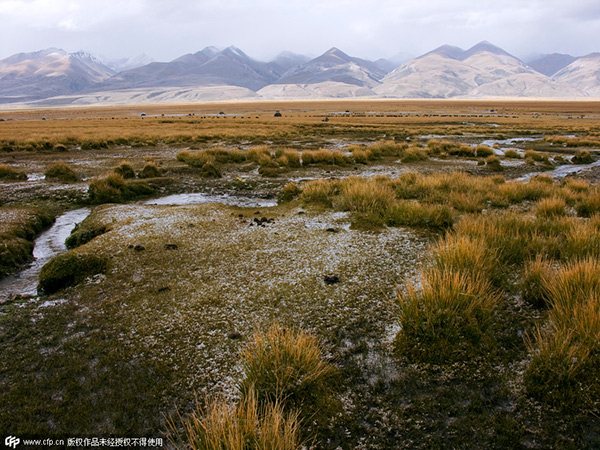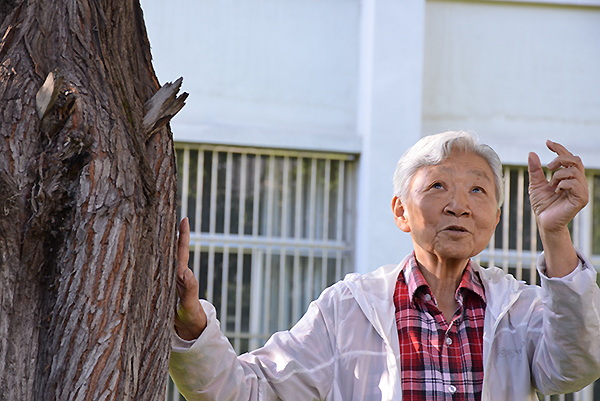Too hard to say goodbye to Tibet: China's Jane Goodall
Updated: 2015-08-27 09:21
By Chen Bei in Nyingchi(chinadaily.com.cn)
|
||||||||
Editor's Note: This year marks the 50th anniversary of the founding of Tibet autonomous region. The China Daily website profiles ten ordinary people, providing a snapshot of life in contemporary Tibet and the great changes the region has experienced over the past 50 years.
 |
|
A 2008 file photo shows the wildness of alpine steppes studded with saline lakes and wetlands in Chang Tang, a high altitude plateau in northern Tibet autonomous region. [Photo/IC]] |
At nearly 5,000 meters above sea level, there ran two vehicles – an SUV and a truck – along the wildness of rolling alpine steppes studded with sand dunes, saline lakes and wetlands.
It was 1992. A seven-person ecology team spent more than one month driving some 14,000 km to do research in Chang Tang, a high altitude plateau in northern Tibet autonomous region. A year later and thanks to their efforts, the vast region was protected as a nature reserve with an area covering 247,000 sq km, the second largest of its kind in the world.
"As we drove into night one day, we saw flickering lights about hundreds of meters ahead and thought there would be inhabitants," recalled the team head Xu Fengxiang, 84, on a visit to eastern Tibet's Nyingchi city, where she founded China's first high-altitude ecology research institute 30 years ago.
The reddish-greenish flashes turned out to be the eyes of more than a dozen adult wolves. When the ecologists realized the danger, the howling pack had already surrounded them.
"The moment my driver rolled down the window and aimed a gun at the wolves, I stopped him," said Xu, the only woman of the research team. "I gave him three instructions – turn on both rear and head lights, blow the whistle and drive at a slower speed."
These instructions finally helped them break out of the siege of wolves.
Although it took place 23 years ago, the 84-year-old legend's memory of this thrilling adventure is still vivid. Age has not dulled her sharp mind or senses.
"This incident proved my point that there is active wildlife, including wolves, Tibetan gazelles, snow leopards and varieties of plants, in the so-called lifeless zone," said Xu, who proposed the region should be protected.
The ecologist had a maverick view of the relationship between man and nature. She insisted human beings have an equal status with other animal and plant species, which co-exist in the ecosystem.
"Man is nothing but one tiny biotic component in the entire ecosystem, and man should place himself at the mercy of nature rather than seek power over it at its source," she said.
Xu's love affair with nature has been running deep through her veins her whole life.
The love became an obsession in 1978, when the then 47-year-old university forestry ecology teacher bid farewell to her family in East China's Nanjing and began research on what she called five high-altitude ecosystems – glacier, water, grass, forest and fragile elements of coldness, aridness as well as desertification – on the Tibetan Plateau.
- Hungary scrambles to confront migrant influx
- Turkey to hold snap parliamentary election
- Caroline Kennedy used personal email for official business
- Czech appeals for closing Schengen external border
- DPRK says inter-Korean contact gives lesson to South Korea
- Trial starts for Chinese scholar expelled from Norway

 Female honor guards train for military parade debut
Female honor guards train for military parade debut
 Floral replica of the Great Wall appears on Tian'anmen Square
Floral replica of the Great Wall appears on Tian'anmen Square
 Chinese long jumpers leap to history
Chinese long jumpers leap to history
 Goodbyes and tears as left-behind children head home
Goodbyes and tears as left-behind children head home
 Top 10 richest universities in China
Top 10 richest universities in China
 Chinese long jumpers leap to history
Chinese long jumpers leap to history
 Female honor guards train for military parade debut
Female honor guards train for military parade debut
 Top 10 richest universities in China
Top 10 richest universities in China
Most Viewed
Editor's Picks

|

|

|

|

|

|
Today's Top News
Shooting suspect had history of workplace issues
11 under probe and 12 detained over Tianjin blasts
War anniversary: Britons born in captivity, raised in freedom
Too hard to say goodbye to Tibet: China's Jane Goodall
Two US TV journalists fatally shot on air
Smaller cub died at National Zoo
Central bank lowers lending rate to ease debts
Officials on suspended death sentence face life behind bars
US Weekly

|

|







